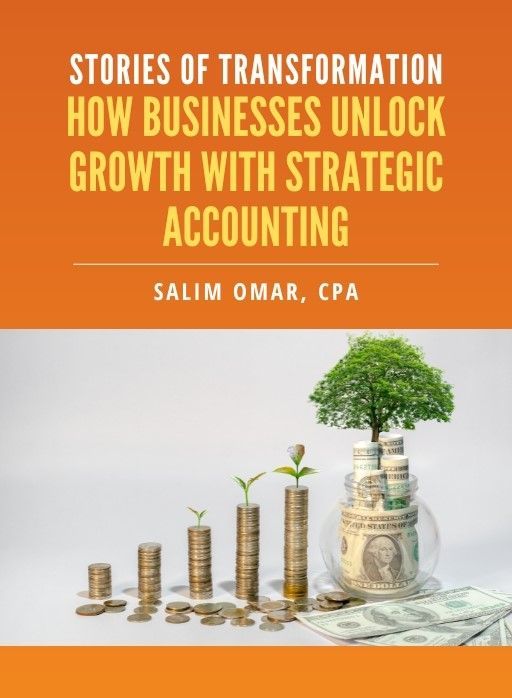Can Your Bookkeeper Do This? What Only a CPA Can Deliver

Knowing the Difference Between Keeping Track and Steering the Ship
Every business starts with the basics—someone to pay the bills, track expenses, and keep tabs on the cash. That’s where a bookkeeper shines. But as businesses grow, the stakes grow with them. Tax mistakes? Costly. Missed opportunities? Even worse. That’s where a Certified Public Accountant (CPA) steps in.
So how do you know when your business has outgrown bookkeeping alone? And what exactly can a CPA bring to the table that a bookkeeper simply can’t?
Let’s break it down.
Bookkeeping: The Foundation
Bookkeepers are the unsung heroes of day-to-day financial operations. They:
- Record financial transactions
- Manage accounts receivable and payable
- Reconcile bank statements
- Handle payroll processing
- Maintain the general ledger
Their work is essential for keeping your financial house in order. But their role is mostly historical—focused on what has already happened. They’re not trained to interpret data, offer strategic insights, or navigate complex tax codes.
Which is fine—until it’s not.
When Compliance, Planning, and Growth Come Into Play
Running a growing business means facing real financial decisions. That’s where a CPA becomes more than helpful—they become critical. Unlike bookkeepers, CPAs are licensed professionals who pass rigorous exams and keep up with continuing education. Their expertise extends far beyond recording transactions.
Here’s what CPAs do that bookkeepers don’t:
1. Tax Planning and Filing
Bookkeepers can organize receipts and label transactions, but CPAs understand the tax implications of every financial move. They:
- Minimize tax liability with legal strategies
- Help structure deductions and credits
- Know how to avoid red flags that trigger audits
- File taxes accurately and handle IRS correspondence
When you’re running a business, especially one with multiple income streams, having a tax-savvy CPA in your corner can be the difference between a big refund and a painful penalty.
2. Strategic Financial Advice
A bookkeeper can tell you what you spent last month. A CPA can tell you what to expect next quarter—and how to prepare for it.
CPAs look ahead. They:
- Build forecasts and cash flow models
- Advise on pricing, cost-cutting, and growth strategies
- Help plan for major milestones like hiring, expansion, or acquisition
- Offer insight into long-term profitability and sustainability
You don’t just get reports—you get recommendations.
3. Entity Selection and Restructuring
Choosing the right business structure (LLC, S-Corp, C-Corp) isn’t just a legal decision—it’s a tax strategy. CPAs guide business owners through:
- Initial entity setup based on income, risk, and goals
- S-corp elections to save on self-employment taxes
- Restructuring as revenue grows or business partners change
A misstep here could cost thousands. CPAs make sure the foundation supports your future.
4. Audit Representation
If the IRS comes knocking, a bookkeeper might help gather paperwork—but they can’t represent you. CPAs are federally authorized to:
- Represent clients in audits
- Negotiate with the IRS
- Respond to notices and requests on your behalf
This isn’t about fear—it’s about confidence. With a CPA, you’re never going into it alone.
5. Financial Statement Preparation for Lenders or Investors
Need a loan or outside funding? Lenders and investors don’t just want clean books—they want assurance that your financials are professionally reviewed or compiled. CPAs prepare:
- Compiled, reviewed, or audited financial statements
- Financial ratio analysis and performance metrics
- Documentation that builds lender confidence
This opens doors a bookkeeper simply can’t.
So… Do You Need Both?
In many cases—yes. Bookkeepers and CPAs are not competitors. They’re collaborators. Your bookkeeper keeps the books clean and current. Your CPA uses that data to protect, guide, and grow your business.
If you’re juggling higher income, managing contractors, launching new services, or expanding across states—it’s time. Time to level up.
Signs It’s Time to Hire a CPA
- Your income has increased significantly
- You’re paying too much in taxes (and not sure why)
- You’re applying for financing or pitching investors
- You’re navigating payroll for multiple states or employees
- You’re planning to sell, merge, or acquire another business
- You’re ready for proactive—not just reactive—financial strategy
Why Straight Talk CPAs?
Straight Talk CPAs isn’t about fluff or fancy jargon. We roll up our sleeves and deliver:
- Virtual tax and accounting services tailored to your goals
- Real-time communication with actual experts
- Strategy that saves you money and time
We help clients graduate from basic bookkeeping into full financial leadership. Because when your business is growing fast, you don’t just need someone to record the past. You need someone who can shape the future.
Free eBook:
Stories of Transformation


Salim is a straight-talking CPA with 30+ years of entrepreneurial and accounting experience. His professional background includes experience as a former Chief Financial Officer and, for the last twenty-five years, as a serial 7-Figure entrepreneur.




